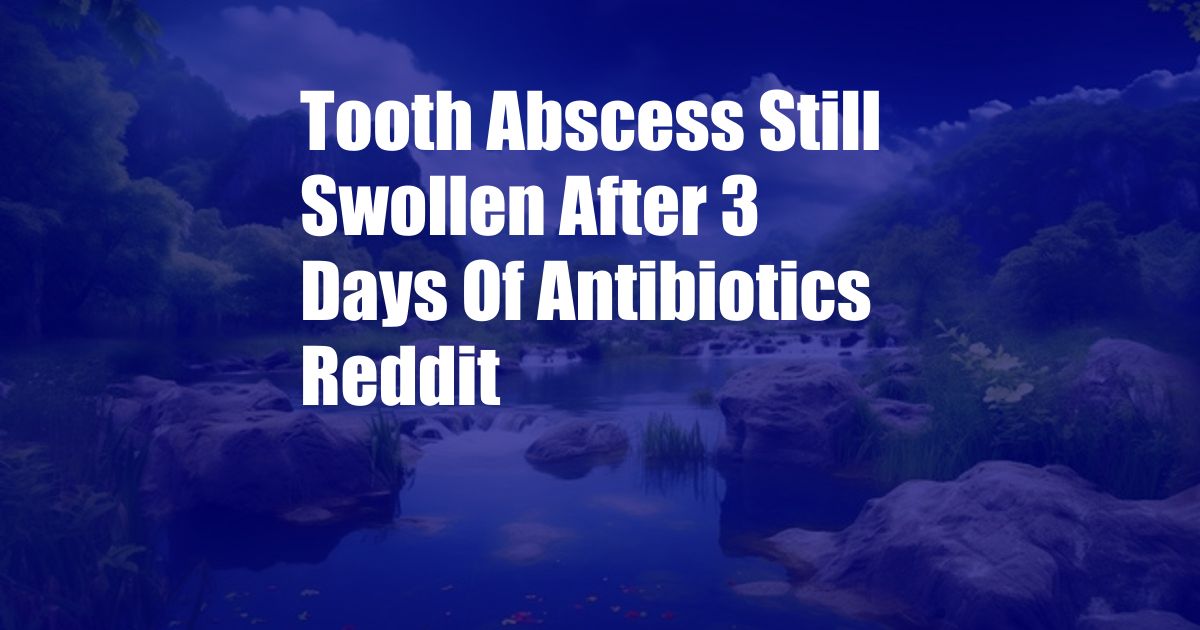
Tooth Abscess Still Swollen After 3 Days of Antibiotics: What You Need to Know
If you’re experiencing a tooth abscess, you know how painful and uncomfortable it can be. You may be wondering why your tooth abscess is still swollen after 3 days of antibiotics. This article will provide you with information about tooth abscesses, including their symptoms, causes, and treatment options. We’ll also discuss why your tooth abscess may still be swollen after 3 days of antibiotics and what you can do about it.
A tooth abscess is a pocket of pus that forms in the tooth. It’s usually caused by a bacterial infection. Symptoms of a tooth abscess can include:
- Severe tooth pain
- Swelling of the face, gums, or jaw
- Fever
- Chills
- Nausea
- Vomiting
If you’re experiencing any of these symptoms, it’s important to see your dentist right away. A tooth abscess can be a serious infection, and it can lead to other health problems if it’s not treated.
Treatment for a Tooth Abscess
The treatment for a tooth abscess typically involves taking antibiotics to clear the infection. Your dentist may also need to drain the abscess and remove the infected tooth. In some cases, a root canal may be necessary to save the tooth.
If you’re taking antibiotics for a tooth abscess, it’s important to take them exactly as directed. Don’t stop taking the antibiotics even if you start to feel better. Stopping the antibiotics early can allow the infection to come back.
It’s also important to see your dentist for follow-up appointments after you’ve finished taking the antibiotics. Your dentist will need to check to make sure that the infection has cleared up and that the tooth is healing properly.
Why Is My Tooth Abscess Still Swollen After 3 Days of Antibiotics?
There are a few reasons why your tooth abscess may still be swollen after 3 days of antibiotics. One possibility is that the infection is not responding to the antibiotics. Another possibility is that the abscess is not draining properly. In some cases, it may be necessary to have the abscess drained surgically.
If your tooth abscess is still swollen after 3 days of antibiotics, it’s important to see your dentist right away. Your dentist will be able to determine why the abscess is still swollen and recommend the appropriate treatment.
Tips for Dealing with a Tooth Abscess
In addition to taking antibiotics and seeing your dentist for follow-up appointments, there are a few things you can do at home to help deal with a tooth abscess. These include:
- Rinse your mouth with warm salt water several times a day.
- Apply a cold compress to the swollen area.
- Take over-the-counter pain medication, such as ibuprofen or acetaminophen.
- Eat soft foods that are easy to chew.
- Avoid chewing on the side of your mouth with the abscess.
Following these tips can help to reduce the pain and swelling associated with a tooth abscess. However, it’s important to remember that these are only temporary measures. It’s still important to see your dentist for treatment as soon as possible.
FAQ About Tooth Abscesses
Here are some answers to frequently asked questions about tooth abscesses:
- Can a tooth abscess go away on its own?
- Can a tooth abscess be fatal?
- How can I prevent a tooth abscess?
No, a tooth abscess will not go away on its own. It requires treatment with antibiotics and possibly other procedures.
In rare cases, a tooth abscess can be fatal if the infection spreads to the bloodstream or brain.
The best way to prevent a tooth abscess is to practice good oral hygiene. This includes brushing your teeth twice a day, flossing daily, and seeing your dentist for regular checkups and cleanings.
Conclusion
A tooth abscess is a serious infection that can lead to other health problems if it’s not treated. If you’re experiencing any symptoms of a tooth abscess, it’s important to see your dentist right away. Early diagnosis and treatment can help to prevent the infection from spreading and causing further damage.
If you have any questions about tooth abscesses, please don’t hesitate to ask your dentist. They will be able to provide you with more information and recommend the best course of treatment for you.